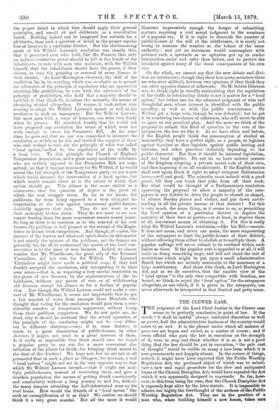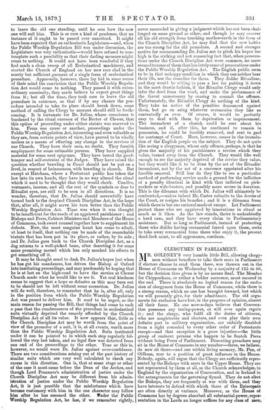THE CLEWER CASE. T HE judgment of the Lord Chief Justice
in the Clewer ease seems to be perfectly conclusive, in point of law. If the words "it shall be lawful" always conferred discretion as well as power, half the administrative business of the country would come to an end. It is the phrase under which all manner of processes are begun and ended, as a matter of course ; and if every official who puts the law in execution on the strength of it, were to stop and think whether it is or is not a good thing that the law should be put in execution, "the pale cast of thought" would be visible on many a face from which it is now permanently and happily absent. In the nature of things, indeed, it might have been expected that the Public Worship Regulation Act, the professed object of which was to substi- tute a new and rapid procedure for the slow and antiquated forms of the Church Discipline Act, would have repealed the Act which it was apparently designed to supersede. So far, how- ever, is this from being the case, that the Church Discipline Act is expressly-kept alive by the later statute. It is impossible to admire too highly the forethought of the authors &the Public Worship Regulation Act. They are in the position of a man who, when building himself a new house, takes care to leave the old one standing, until he sees how the new one will suit him. This is so rare a kind of prudence, that no instance of it ought to be passed over unnoticed. It might have been expected that an enthusiastic Legislature—and, when the Public Worship Regulation Bill was under discussion, the Legislature was very enthusiastic—would have refused to con- template such a possibility as that their darling measure might come to nothing. It would not have been wonderful if they had made a clean sweep of all Ecclesiastical machinery, and started the Church of England on her new race clad in the scanty but sufficient garment of a single form of ecclesiastical procedure. Apparently, however, there lay hid in some recess of their mind the conviction that the Public Worship Regula- tion Act would come to nothing. They passed it with extra- ordinary unanimity, they made believe to expect great things from it ; but all the time, they took care to leave the old procedure in existence, so that if by any chance the pro- cedure intended to take its place should .break down, some method of calling the Clergy to account should still be forth- coming. It is fortunate for Dr. Julius, whose conscience is burdened by the ritual excesses of the Rector of Clewer, that this option of proceeding under either statute was reserved to him. From one cause or another, proceedings under the Public Worship Regulation Act, interesting and even valuable as they are, from certain points of view, have proved to be wholly useless as a means of effecting any change in the services of our Church. They have their uses, no doubt. They furnish employment for some estimable persons. They have supplied material for some neat epigrams. They have tested the good- temper and self-restraint of the Judges. They have raised the question whether brawling in Court should not be put on a level, in respect of heinousness, with brawling in church. But except at Hatcham, where a Protestant public has taken the law into its own hands, they have in no way altered the ritual which it used to be thought that they would check. Candles, vestments, incense, and all the rest of the symbols so dear to Ritualist eyes, are still to be seen in all directions. It is no wonder, therefore, that Dr. Julius should sorrowfully have turned back to the despised Church Discipline Act, in the hope that, after all, it might serve his turn better than the Public Worship Regulation Act. Time was when it was thought to be insufficient for the needs of an aggrieved parishioner ; and Bishops and Peers, Cabinet Ministers and Members of the House of Commons, took sweet counsel together how to supplement its defects. Now, the most sanguine heart has come to admit, at least to itself, that nothing can be made of the remarkable 'statute that has been put in its place, or rather, by its side ; and Dr. Julius goes back to the Church Discipline Act, as a dog returns to a well-picked bone, after deserting it for some more promising morsel which has only mocked his efforts to get something off it.
It may be thought cruel to dash Dr. Julius's hopes just when he has got his mandamus, has driven the Bishop of Oxford into instituting proceedings, and may pardonably be hoping that he is at last on the high-road to have the service at Clewer Church made what he would like to see it. Yet real kindness seems to suggest that a hope so delusive as this may turn out to be should not be left without some correction. Dr. Julius will do well, therefore, to remember that he is, after all, only in the position from which the Public Worship Regulation Act was passed to deliver him. It used to be urged, as the main reason for passing the Bill, that things had come to such a pass that the cumbrousness of the procedure in ecclesiastical suits virtually deprived the remedy afforded by the Church Discipline Act of all its value. It now appears that, little as the Church Discipline Act may be worth from the point of view of the promoter of a suit, it is, at all events, worth more than the Public Worship Regulation Act. Suits instituted under it can be pointed to in which each step regularly fol- lowed the step last taken, and no legal flaw was detected from one end of the proceedings to the other. True as this-is, however, we would warn Dr. Julius against over-confidence. There are two considerations arising out of the past history of similar suits which are very well -calculated to check any excess in this direction. One is, that at some stage or other of the case it must come before the Dean of the Arches, and though Lord• Penzance's administration of justice under the Church Discipline Act may be different from his admin- istration of justice under the Public Worship Regulation Act, it is just possible that the misfortunes which have become customary with him in the one character may follow him after he has assumed the other.. Ignder the Public Warship Regulation Act, he has, if we remember rightly, never succeeded in giving a judgment which has not been chal- lenged on some ground or other, and though he may recover all his old strength from touching mother-earth in the form of the Church Discipline Act, he may find that the new habits are too strong for the old procedure. A second and stronger motive for recommending Dr. Julius not to pitch his hopes too high is the striking and not reassuring fact that, when prosecu- tions under the Church Discipline Act were common, no more seemed to come of them than has lately come of prosecutions under the Public Worship Regulation Act. The English public seem to be in that unhappy condition in which they can neither bear their ills, nor the remedies for them. They dislike Ritualism, and they would be willing to pass a law for putting it down in the most drastic fashion, if the Ritualist Clergy would only infer the deed from the word, and make the performance of the threat unnecessary by ceasing to commit the offence. Unfortunately, the Ritualist Clergy do nothing of the kind. They take no notice of the penalties denounced against them, but go on using whatever ceremonies they like as contentedly as ever. Of course, it would be perfectly easy to deal with them by deprivation or imprisonment. The incumbent of a church could be sent about his business, and if, after this, he continued to remain in possession, he could be forcibly removed, and sent to gaol for contempt of Court. Here, however, comes in the irresolu- tion of the English people on the subject. They do not quite like seeing a clergyman, whose only offence, perhaps, is that he gives the majority of his parishioners a service which they value, turned away from the Church. They would like well enough to see the majority deprived of the service they value, but they would like it to be done by the act of the Ritualist incumbent, not by the act of a successor appointed after his forcible removal. Still less do they like to see a particular method of performing service made a ground for the infliction of a penalty identical in kind with that inflicted on pick- pockets or wife-beaters, and possibly more severe in duration. This is the dilemma with which Dr. Julius will ultimately- be confronted,—unless indeed Mr. Carter submits to the decree of the Court, or resigns his benefice ; and it is a dilemma from which there is but one rational mode of escape. Let Parliament protect those who are aggrieved by innovations in ritual as much as it likes. As the law stands, theirs is undoubtedly a hard case, and they have every claim to Parliamentary assistance. But so long as Parliament, instead of protecting those who dislike having ceremonial forced upon them, seeks to take away ceremonial from those who enjoy it, the present dead-lock must, to all appearance, continue.



































 Previous page
Previous page